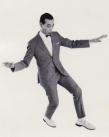
Early on in Tim Burton's feature-length debut, Pee Wee's Big Adventure (1985), Madame Ruby the fortune-teller informs Pee Wee, "You're here because you ... want something!" Of course, of course. But what? For Pee Wee, the answer is simple: his bike, the gleaming MacGuffin of this voyage north by northwest--actually, more of a goofy Rosebud, with its elusive allure, its promise of perfection captured in a snowglobe--or, in Pee Wee's case, "a cable-knit sweater that someone keeps knitting and knitting and knitting and knitting ... ."
What, though, did I want in 1985, a year from thirty, that this movie would so strike me as hilarious and true? A friend of mine used to say that Pee Wee's Big Adventure was funny only when watching it with me, because I thought it was so funny. And I admit it was, and is: completely irresistible to some obsessive part of my brain that feels perfection just enough out of reach that it may as well be at the other end of the universe, or of life; exciting with the shivery frisson of recognition of some half-buried desire; completely innocent in its exploration of the loss of innocence, its post-something wink at everything I'd forgotten about the solitary moments of childhood, in which I held the world I'd invented close to my face so that the other one could fade away; and of course exploding with the joy of self, in which the tiniest bite of cereal is savored, because you can hold your own spoon now.
Pee Wee's Big Adventure fed me well, and I could spend all day--as I have too often--going over favorite moments and lines. But, lucky you, I'm not going to do so. Instead, let's consider the aural mise-en-scene, if I can call it that, sustained by Danny Elfman's remarkable score--another debut, by the way, like Bernard Herrmann in the above-referenced Citizen Kane. Elfman has cheerfully admitted his inspiration: Nino Rota, especially his circus music for Federico Felinni. I've never watched Pee Wee alongside La Strada or 8 1/2 or even Amarcord, even though the last deserves pairing with Pee Wee, in that both invent a reality from memories of childhood that is slyly subversive and heartfelt and satirical all at once. In any case, Elfman's music for Pee Wee generates a kind of safe hysteria/delirium, in which Pee Wee's complete disassociation from reality has the force to transform the world around him. It is a kind of light-hearted expressionism that externalizes the Id to reveal it as a kitschy Merry Prankster whose free pass gets you on all the rides. Elfman not merely underlines this, but helps create the carnival--and not a Dark One, as in Ray Bradbury, but a homemade backyard fair, built by the children of indulgent parents who don't mind a lot of junk cluttering up the back yard.
Danny Elfman's music urges me to remember that feeling of freedom; I'm reminded of the kids in Hal Roach's Our Gang shorts, who always seemed to have ready access to vacant lots, spare parts, and the occasional mule or goat to hand-build a world separate from any lasting harm. Elfman's music combines with Tim Burton's reckless enthusiasm to actualize Paul Reubens' monomaniacal insistence that all of us are loners, rebels, who may not remember much (except, naturally, the Alamo), and who may all have big but's; but, under the guise of the Bicycle Quest, still can run away and join the circus.
No comments:
Post a Comment